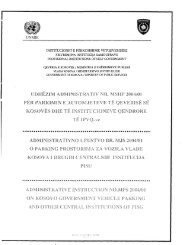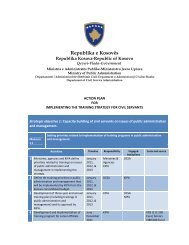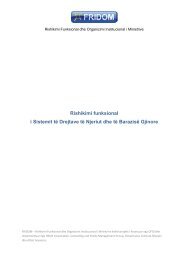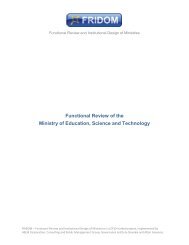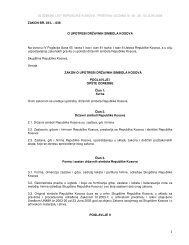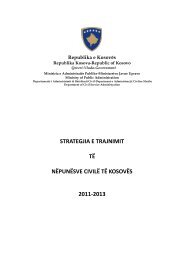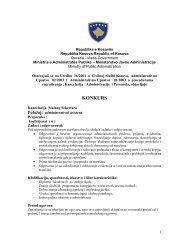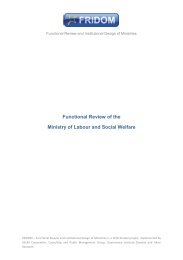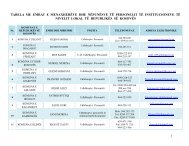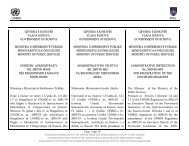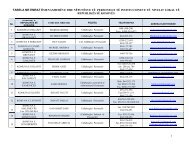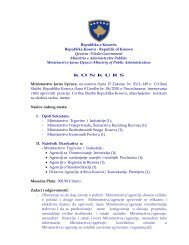Functional Review of the Ministry of Environment and Spatial Planning
Functional Review of the Ministry of Environment and Spatial Planning
Functional Review of the Ministry of Environment and Spatial Planning
Create successful ePaper yourself
Turn your PDF publications into a flip-book with our unique Google optimized e-Paper software.
determine <strong>the</strong> charges for public utility services 1 . It will be necessary to develop <strong>and</strong> implement a strategy<br />
for sustainable financial <strong>and</strong> administrative management <strong>of</strong> public utilities. It will be important to assist<br />
centrally <strong>and</strong>, in <strong>the</strong> above mentioned very practical ways, support <strong>the</strong> municipalities in <strong>the</strong>ir effort to<br />
adequately manage public utility service delivery.<br />
Recommendation III.4: Develop state-wide policy on delegated management <strong>and</strong> financing <strong>of</strong> <strong>the</strong> water,<br />
waste-water <strong>and</strong> solid waste sectors<br />
A fur<strong>the</strong>r shortcoming <strong>of</strong> departments described is that it makes insufficient use <strong>of</strong> economic <strong>and</strong> fiscal<br />
policies. Specifically:<br />
1. An economically-socially feasible <strong>and</strong> balanced policy package is missing in respect <strong>of</strong> payments<br />
for services provided by <strong>the</strong> environment sector.<br />
2. The policy for use <strong>of</strong> economic instruments ought to be amplified, so as:<br />
a) to really modify <strong>the</strong> behaviour <strong>of</strong> people <strong>and</strong> institutions towards better environmental protection<br />
by providing incentives for reduction <strong>of</strong> pollution <strong>and</strong><br />
b) to raise sizeable revenue for investment in environmental quality improvement.<br />
At present some economic instruments exist <strong>and</strong> work to some extent, for example charges <strong>and</strong> fees for<br />
drinking water management. O<strong>the</strong>rs are not working at all; for example no charges are being collected<br />
from enterprises for <strong>the</strong> emission <strong>of</strong> air pollutants or discharging waste water. Their performance is not<br />
monitored. Basically <strong>the</strong> institutional capacity is weak for running an effective <strong>and</strong> forceful policy.<br />
The key principles that ‘users pay’ <strong>and</strong> ‘polluters pay’, both commonly used through <strong>the</strong> whole EU, will be<br />
a must for <strong>the</strong> fur<strong>the</strong>r international donors’ aid programmes.<br />
Recommendation III.5: Adopt <strong>the</strong> economic instruments for collecting <strong>the</strong> charges from industries for <strong>the</strong><br />
emission <strong>of</strong> air pollutants <strong>and</strong> discharging <strong>the</strong> waste waters.<br />
These instruments are, <strong>of</strong> course, absolutely different from <strong>the</strong> penalties or o<strong>the</strong>r penalizations imposed for<br />
<strong>the</strong> pollution <strong>of</strong> environmental media. Ei<strong>the</strong>r environmental administration will be capable enough to arrange<br />
for economic instruments to protect <strong>the</strong> sector on one h<strong>and</strong>, <strong>and</strong> to create sectoral income on <strong>the</strong> o<strong>the</strong>r, or<br />
this sector will be unable to cope with <strong>the</strong> financial challenges <strong>and</strong> remain a problem sector for <strong>the</strong> long-term.<br />
This recommendation is closely tied with <strong>the</strong> recommendation 11.<br />
III.1.5 The public information function<br />
The public information function <strong>and</strong> cooperation with environmental NGOs are <strong>the</strong> tasks <strong>of</strong> <strong>the</strong><br />
<strong>Environment</strong>al Protection Department.<br />
The provisions <strong>of</strong> <strong>the</strong> Aarhus Convention grant every citizen <strong>the</strong> right <strong>of</strong> free access to information <strong>and</strong> <strong>the</strong><br />
right to participate in environmental decision-making. Government <strong>of</strong>fices recognise <strong>the</strong>ir duties regarding<br />
<strong>the</strong> public information function (Art 57 <strong>of</strong> <strong>the</strong> Law on <strong>Environment</strong>al Protection). This is demonstrated by<br />
<strong>the</strong> reportedly high rate <strong>of</strong> non-payment <strong>of</strong> municipal fees, inappropriate waste-disposal <strong>and</strong> little scrutiny<br />
<strong>of</strong> <strong>the</strong> public-private bodies responsible for aspects <strong>of</strong> environmental management. The general public<br />
does not underst<strong>and</strong> that private society could <strong>and</strong> should be an ally <strong>of</strong> <strong>the</strong> public administration in<br />
enforcement <strong>of</strong> order <strong>and</strong> <strong>the</strong> law. Public responsibility for <strong>the</strong> environment is not well developed <strong>and</strong><br />
public interest for environmental issues is low. This is also reflected in <strong>the</strong> coverage <strong>of</strong> <strong>the</strong>se issues in <strong>the</strong><br />
media.<br />
The number <strong>of</strong> local environmental Non-Governmental Organisations (NGOs) in Kosovo is 30, with 2878<br />
members in total. According to <strong>the</strong> Regional <strong>Environment</strong>al Centre’s (REC) database <strong>of</strong> environmental<br />
NGOs (2007), <strong>the</strong> five top priorities <strong>of</strong> Kosovo NGOs are:<br />
1 Only 65-70% <strong>of</strong> <strong>the</strong> total population has access to <strong>the</strong> drinking water <strong>and</strong> 28-30 % is connected to <strong>the</strong> sewage network (data from<br />
2005). There is no one wastewater treatment plant (WWTP) in <strong>the</strong> whole <strong>of</strong> Kosovo (in four small-size municipalities are being built<br />
only recently by EAR support).<br />
22



